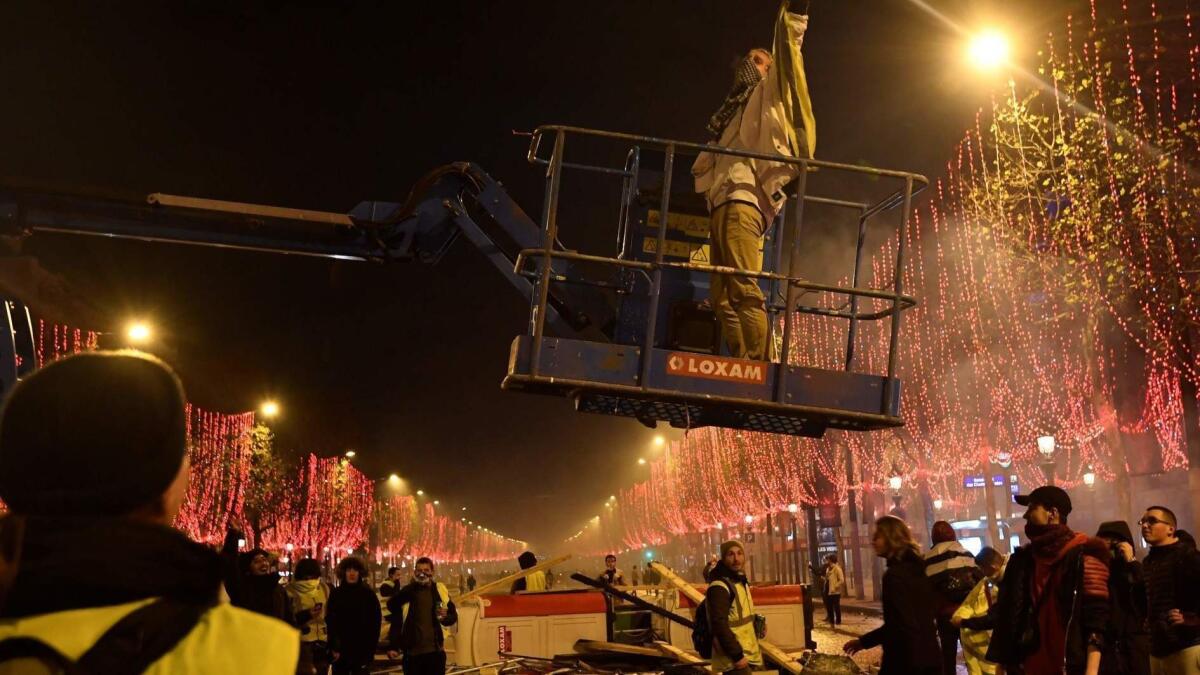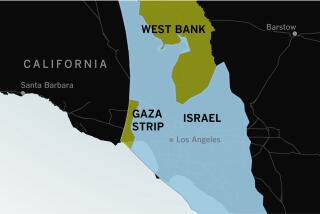Contretemps on the Champs-Elysées: Gendarmes fire tear gas at protest over diesel tax hike

- Share via
Reporting from Paris — Demonstrators angry at French President Emmanuel Macron and rising fuel taxes clashed with police in the heart of Paris on Saturday, turning the Champs-Elysées into a fiery battleground.
Thousands of protesters wearing high-visibility vests, known as Gilets Jaunes (Yellow Vests), converged near the Arc de Triomphe in a challenge to Macron and his centrist government. Many came from rural areas where locals accuse national leaders of ignoring increasing hardship and poverty. As they marched in defiance of an order from authorities to keep away from the thoroughfare popular with tourists, police responded with tear gas and water cannons.
Some of the demonstrators responded by building barricades and setting fire to them. Interior Minister Christophe Castaner blamed “ultra right” hooligans for turning what was expected to be a peaceful demonstration into a violent one.
“The right to demonstrate is a fundamental right and we will protect that,” Castaner said at a news conference. “But we cannot protect those carried away by violence … those who only want to protest should withdraw and denounce the violence.”
Saturday’s clashes came after the Yellow Vests, an ad hoc movement with no official leader, organization or political affiliation, relied on social media to call for a second wave of demonstrations following a first wave a week ago. In the first, 280,000 people, according to government estimates, took part in protests at 2,000 sites across France. Two people died and more than 600 were injured. This week, officials said, more than 106,000 people have taken part in protests across France.
The civil unrest has been sparked by increases in gasoline and diesel taxes. Earlier this year, Macron raised the tax on diesel by 7.6 cents per liter and gasoline by 2.9 cents. Further increases of 6.5 cents per liter for diesel and 3.9 cents for gasoline are due in January. Ministers say the hike is an environmental measure to wean the French off their dependence on fossil fuels.
But the anger has transformed to reveal a more profound dissatisfaction with Macron and his centrist administration.
Demonstrators accuse the government of being out of touch with those on low incomes living in rural areas who can no longer afford to run the vehicles they need to live and work, and say the fuel tax hikes are a final straw. Macron is also accused by protesters of catering to the rich through labor law changes that curtail some rights and privileges of workers, while cutting taxes for businesses and the wealthy.
“There are so many things we are fed up with,” said Bruno Binelli, 66, a retired carpenter, who left his home near the southeastern city of Lyons 250 miles away in the early hours of Saturday to join the demonstration in Paris. “We pay our taxes, then they add more taxes. It’s all too much. We have the feeling that those of us who live in the countryside are forgotten. Paris sucks us of money for new museums, new buildings, the Olympic Games, but nobody listens to us. Macron listens to nothing.”
An opinion poll by the consulting firm BVA published Friday found Macron’s popularity had dropped to 26%, three points down from last month and well below those of his immediate predecessors François Hollande (48%) and Nicolas Sarkozy (29%) at the same stage of their term in office.
Another survey for the newspaper Le Figaro indicated nearly 80% of those polled support the fuel protest and more than 80% want Macron to drop the tax hikes.
Joel Mouilleseaux, 24, a student from Creil in northern France, said he was demonstrating because “things need to change.”
“It’s always the same people who pay. We work, we pay, work some more, pay some more. It’s been like that for years,” Mouilleseaux said. “We’re here because we’ve had enough. I want to be heard, listened to and get a response.”
On Saturday evening the Yellow Vests called for further demonstrations next weekend. The event published on Facebook was called “Act 3: Macron Resign.”
Willsher is a special correspondent.
More to Read
Sign up for Essential California
The most important California stories and recommendations in your inbox every morning.
You may occasionally receive promotional content from the Los Angeles Times.













